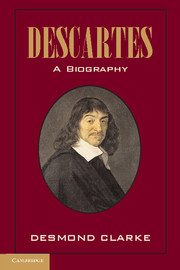Book contents
- Frontmatter
- Contents
- Preface and Acknowledgments
- Note on Texts and References
- Descartes Family Tree
- Introduction
- 1 A Lawyer's Education
- 2 In Search of a Career (1616–1622)
- 3 Magic, Mathematics, and Mechanics: Paris, 1622–1628
- 4 A Fabulous World (1629–1633)
- 5 The Scientific Essays and the Discourse on Method (1633–1637)
- 6 Retreat and Defence (1637–1639)
- 7 Metaphysics in a Hornet's Nest (1639–1642)
- 8 The French Liar's Monkey and the Utrecht Crisis
- 9 Descartes and Princess Elizabeth
- 10 The Principles of Philosophy (1644)
- 11 The Quarrel and Final Rift with Regius
- 12 Once More into Battle: The Leiden Theologians (1647)
- 13 Thoughts of Retirement
- 14 Death in Sweden
- Appendix 1 Descartes' Principal Works
- Appendix 2 Places Where Descartes Lived
- Notes
- Bibliography
- Index
2 - In Search of a Career (1616–1622)
Published online by Cambridge University Press: 18 July 2009
- Frontmatter
- Contents
- Preface and Acknowledgments
- Note on Texts and References
- Descartes Family Tree
- Introduction
- 1 A Lawyer's Education
- 2 In Search of a Career (1616–1622)
- 3 Magic, Mathematics, and Mechanics: Paris, 1622–1628
- 4 A Fabulous World (1629–1633)
- 5 The Scientific Essays and the Discourse on Method (1633–1637)
- 6 Retreat and Defence (1637–1639)
- 7 Metaphysics in a Hornet's Nest (1639–1642)
- 8 The French Liar's Monkey and the Utrecht Crisis
- 9 Descartes and Princess Elizabeth
- 10 The Principles of Philosophy (1644)
- 11 The Quarrel and Final Rift with Regius
- 12 Once More into Battle: The Leiden Theologians (1647)
- 13 Thoughts of Retirement
- 14 Death in Sweden
- Appendix 1 Descartes' Principal Works
- Appendix 2 Places Where Descartes Lived
- Notes
- Bibliography
- Index
Summary
What path shall I follow in life?
(Ausonius)Descartes made a decisive break with his past and a significant step toward his life's work – although this became clear only in retrospect – when he left France and travelled north to the United Provinces at the beginning of 1618. There is no evidence to suggest that he embarked on this journey with the intention of devoting his life to philosophy, or that he was considering emigrating permanently from France, as he did a decade later. His state of mind, in 1618, was that of a young man who was uncertain about a career. He had provisionally declined to follow his father and his brother into a legal career and had opted instead for the other standard path to social promotion in French life – as a gentleman army officer. He also seemed vaguely conscious of intellectual gaps in his education, and of the benefits of foreign travel to help remedy those deficiencies.
Descartes' formal education had been narrowly scholastic, and it had certainly not provided a basis for the fundamental reform of human knowledge that he eventually undertook. During this period of transition, the young Jesuit alumnus seems to have been willing to consider perspectives as disparate as the mystical and cabalistic writers of the Middle Ages and the astrologers and alchemists of the Renaissance. He mentioned authors as diverse as Ramon Lull, Johannes Kepler, and Thomas Campanella, and flirted briefly with the arcane philosophy of the Rosicrucians.
- Type
- Chapter
- Information
- Descartes: A Biography , pp. 37 - 66Publisher: Cambridge University PressPrint publication year: 2006

